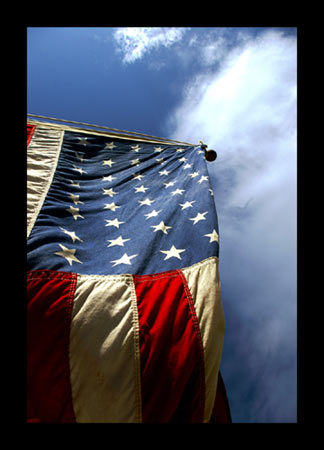
|
It began humbly[1] and rose to great heights over the course of 150 years. Our story begins in London in 1780 with a social club named after a fun loving Roman poet said to have died at 86 while choking on a grape seed. Most of the members of the Anacreontic[2] Society were amateur musicians, though a few of them were professionals. They met every two weeks at the Crown and Anchor Tavern in the Strand.[3] The evening’s entertainment consisted of a concert, dinner, and drinking songs. The society began each evening with a song tailor-made[4] by two of their members. Poet Ralph Tomlinson provided lyrics and antiquarian and musicologist John Stafford Smith contributed a genteel melody.[5] Their song “To Anacreon in Heaven” celebrated the mingling[6] of love and wine. Not everyone loved the society though. The Duchess of Devonshire made a habit of eavesdropping on the proceedings from a secret room in the tavern, and she was no lover of bawdy songs and ballads.[7] No doubt the possibility that she might be listening in at any time had something to do with the demise[8] of the Anacreontic Society in 1786. For the next twenty-eight years its theme song floated from one side of the Atlantic to the other, and in 1814 it turned up in a setting that was anything but convivial[9]. During the War of 1812, as the British retreated from Washington, a well-known Washington lawyer and amateur poet was on a prisoner exchange ship in Baltimore Harbor. The lawyer, Francis Scott Key[10], spent a night nervously watching the British bombardment of nearby Fort McHenry. At sunrise, seeing the American flag still flying over the fort, Key was inspired to write the poem known as “The Star-Spangled Banner”. Key later forwarded his poem to a Baltimore printer, coupling it with a slightly less singable arrangement of “To Anacreon in Heaven”. In 1931, 150 years after its modest beginnings in a London tavern, the quaint old drinking tune became officially the national anthem of the United States. |
起初,这首曲子毫不知名,诞生150多年后,却达到了伟大的高度。故事发生在1780年的伦敦,当时有一个社交俱乐部,是以一位喜欢找乐子的罗马诗人命名的,据说,那位诗人在86岁时被一粒葡萄籽卡住喉咙窒息而死。 尽管这个名为“阿那克里翁社”的成员中有几位是专业人士,但大多还是业余音乐爱好者。成员们每隔两周都会在位于海滨的“皇冠•锚酒馆”聚会。晚上的娱乐活动包括音乐会、晚宴和饮酒歌。每次晚上的聚会都会以演唱一首由两位会员特意谱写的歌曲而拉开序幕。这首歌曲由诗人拉尔夫•汤姆林森作词,古文物家、音乐学者约翰•斯塔夫德配上优雅的旋律。他们的这首《致天堂里的阿那克里翁》赞美了爱情和美酒的交融。 然而,并不是所有人都喜欢这个音乐社。德文郡的公爵夫人就总是习惯在酒馆的一间密室里偷听音乐社的活动,她不喜欢那些低级下流的歌曲和情歌。毫无疑问,1786年阿克那里翁音乐社的解散和公爵夫人那无时不刻的监听不无关系。 在接下来的28年里,音乐社的这首主题曲漂洋过海,传到了大西洋彼岸。1814年,这首曲子出现在了非宴饮的场合。 在1812年的(美英)战争中,当英军撤离华盛顿时,华盛顿一位著名的律师、业余诗人正在巴尔的摩海港的一艘战俘交换船上。整个晚上,这位名叫弗朗西斯•斯科特•凯伊的律师都在紧张地注视着英军对不远处(美军)麦克亨利要塞的炮击。天亮时,当凯伊看到美国国旗仍飘扬在城堡上空的时候,突然灵感勃发,写下了一首题为《星光闪耀的旗帜》的诗作。随后凯伊将这首诗交给了巴尔的摩的一名印刷工,还配上了不太上口的《致天堂里的阿那克里翁》的改编曲。150年后的1931年,这首在伦敦小酒馆里诞生的不起眼的古老饮酒歌正式成了美国国歌。 (来源:英语学习杂志) |
|
Vocabulary: 1. humbly: 卑微地,地位低下地。 2. Anacreontic: (希腊诗人)阿那克里翁的。 3. tavern: 酒馆;strand 海滨。 4. tailor-made: 特制的。 5. antiquarian: 古文物家;contribute: 撰写,谱写;genteel: 高雅的,风雅的。 6. mingling: 混合,交融。 7. duchess: 公爵夫人;bawdy: 低级下流的。 8. demise: 终止,解散。 9. convivial: (适合)酒宴的,欢乐的。 10. Francis Scott Key: 弗朗西斯•斯科特•凯伊(1779—1843),美国国歌《星条旗永不落》的词作者,也是律师和诗人。 |